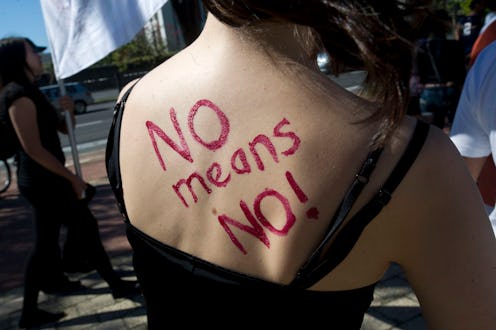News
6 Ways To Help Sexual Assault Victims
The fact that the criminal justice system so regularly fails victims of sexual assault is one of those things that never fails to leave me stunned. For example, Brock Turner, who was convicted of sexually assaulting an intoxicated, unconscious woman behind a dumpster after a college party, was sentenced to just six months in county jail. The woman, whose name has remained private, released the statement she read at Turner's sentencing. It's powerful, and highlights many of the ways rape culture operates in our society, and how she was harmed not only by Turner, but also by the investigation and trial. It's a stunning (and stunningly poised) piece of writing that makes you want to take action.
There is really no substitute for a criminal justice system that protects and supports victims of violent crime, including sexual assault. The fact that the system currently does almost exactly the opposite is a travesty that requires reform. However, there are a lot of things that private citizens can do to help victims of sexual assault. There aren't a lot of specific things you can do for the victim in this particular case, given that she wants to remain anonymous (and obviously, we should all respect that) and hasn't asked the public for anything. But her statement makes it clear that not only is what happened to her unacceptable, but also that the system which allowed it to happen is unacceptable as well. She says as well that she hopes her example helps other people in similar circumstances. So if you feel moved to help her, use that inspiration to help other victims.
Here are six examples of things you can do to help victims of sexual assault.
1. Volunteer
There are many ways that you can volunteer to help victims of sexual assault, including for a sexual assault hotline. For example, the RAINN (Rape, Abuse, and Incest National Network) online hotline does amazing work, and they are far from alone. Volunteering with a hotline can go a long way towards helping victims across the country. You can also find organizations that work with schools to educate kids about consent, or offer counseling, legal advice, or any number of other vital services. Look into groups in your area.
2. Donate
Time is not always easy to come by, and volunteering can be triggering for some people. But you can still support the many, many, many organizations that fight sexual assault and support survivors by donating money, if you're able.
3. Report Whatever The Hell This Is
Like I said, there aren't many things that you can do to specifically help the woman in the Turner case. But reporting sites, pages, and accounts that support the man convicted of assaulting her is probably one of them. Obviously, no one should be threatening whoever runs these sites with any sort of violence — we're all doing this because we oppose violence — but that doesn't mean letting things like the Facebook page "Brock Turner for Olympics 2016" continue unchallenged. Report pages like this, and any others you come across, because harassing survivors or openly supporting a convicted rapist should never be OK.
4. Educate Yourself And Advocate Reform
Chances are, there are a lot of issues in your local community around sexual assault that you might not even be aware of. Are you on a college campus where sexual assault policies are subpar? Do you live in an area where no local hospitals administer rape kits? Are you in a city with a rape kit backlog? Are law enforcement officers in your town trained in how to treat sexual assault victims? These are all components of a much larger issue, but solving the little pieces still makes a big difference. This is the sort of problem that needs to be tackled a little bit at a time.
5. Speak Out
Rape culture is built into our legal system, but it's also a result of people's attitudes and assumptions. So when you hear people say something, push back. When you hear people make rape jokes, challenge them. (My favorite approach is to look confused and say, completely genuinely, "I don't get it. Why is it funny?") If someone is blaming the victim, explain why you think it's wrong. If someone says something that's off about women or sex or consent, don't let it slide.
There are some messed-up attitudes out there. Brock Turner's father, for example, characterized his son raping an unconscious woman as "20 minutes of action." Fighting those attitudes, openly and publicly, goes a long way toward shifting the tide and preventing sexual assaults.
6. Support Survivors In Your Own Life
We've been talking about how to help survivors, but victims of sexual assault are not some strange "other" whom you need to go looking for. They are, depressingly, very common. You might be one yourself; you might not. Either way, you probably know one, whether or not you are aware of it. So remember that when you speak about sexual assault or any related issues. And if someone confides in you about their assault, listen and be supportive.
One of the things the Turner victim's letter makes clear is that recovering from sexual assault is a long and difficult process. She was supported by amazing people in her life, from her family to her boss, and without them, she says she could not have handled the past year. Every survivor deserves that type of support. So try to make sure that you're supporting the survivors in your life in whatever way they need.
Images: Pixabay
